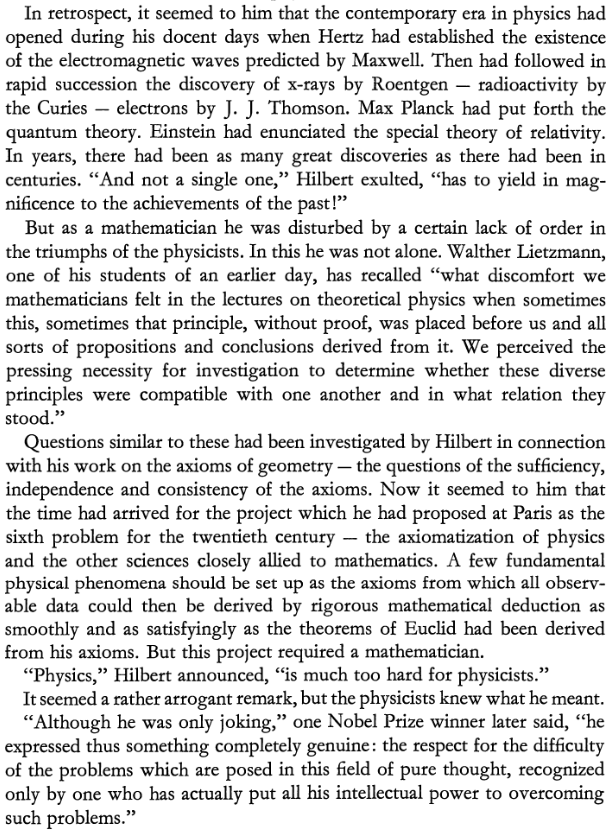nLab David Hilbert
-
Constanze Reid: Hilbert, Springer (1970) [doi:10.1007/978-3-662-28615-9]
Selected writings
On the Nullstellensatz:
- David Hilbert: Über die vollen Invariantensysteme, Mathematische Annalen 42 (1893) 313–373 [doi:10.1007/BF01444162, doi:10.1007/978-3-642-52012-9_19]
On the mathematical foundations of quantum mechanics:
- David Hilbert, John von Neumann, Lothar W. Nordheim, Über die Grundlagen der Quantenmechanik, Math. Ann. 98 (1928) 1–30 [doi:10.1007/BF01451579]
Related pages
Further resources
-
the (English translation) of the lecture of David Hilbert at the International Congress of Mathematicians at Paris in 1900 (with the list of “Hilbert’s problems”) is here
-
Felix E. Browder. Mathematical Developments Arising from Hilbert Problems. Proceedings of Symposia in Pure Mathematics. XXVIII.2. American Mathematical Society.
Lectures by Hilbert on physics and especially on general relativity are collected here:
-
Tilman Sauer, Ulrich Majer with Arne Schirrmacher, Heinz-Jürgen Schmidt (eds.): David Hilbert’s Lectures on the foundations of physics 1915-1927 — Relativity, Quantum Theory and Epistemology, Springer (2009) [doi:10.1007/b12915]
Around pages 417, 423 there is discussion of “Weltgesetze”, roughly what today in fundamental physical might be called theories of everything, with some remarks comparing to the perspective of Hegel in the Science of Logic.
-
Naturerkennen und Logik, Lecture at the Kongress der Gesellschaft Deutscher Naturforscher und Ärtze, 1930 (pdf, audio),
see also Eugene Wigner, The Unreasonable Effectiveness of Mathematics in the Natural Sciences
-
Radio address (1930)
James T. Smith: David Hilbert’s Radio Address, Convergence (February 2014) [old.maa.org/press/periodicals/convergence/david-hilberts-radio-address]
Quotes and anecdotes
In mathematics:
From archive.org/details/philosophyoferns033109mbp:
Cassirer liked to tell the following story: once he met the great mathematician Hilbert, the “Euclid of our time,” and asked him about one of the latter’s disciples. Hilbert answered: “He is all right. You know, for a mathematician he did not have enough imagination. But he has become a poet and now he is doing fine.
On physics (cf. Hilbert's sixth problem), quoted in Reid 1970 p 126:
“Physics is much too hard for physicists.”
(echoed in Amati/Witten’s quote: “String theory is part of the physics of the twenty-first century that fell by chance into the twentieth century.”).
Here is the full paragraph in Reid 1970 p 126:

Last revised on September 4, 2025 at 08:27:02. See the history of this page for a list of all contributions to it.